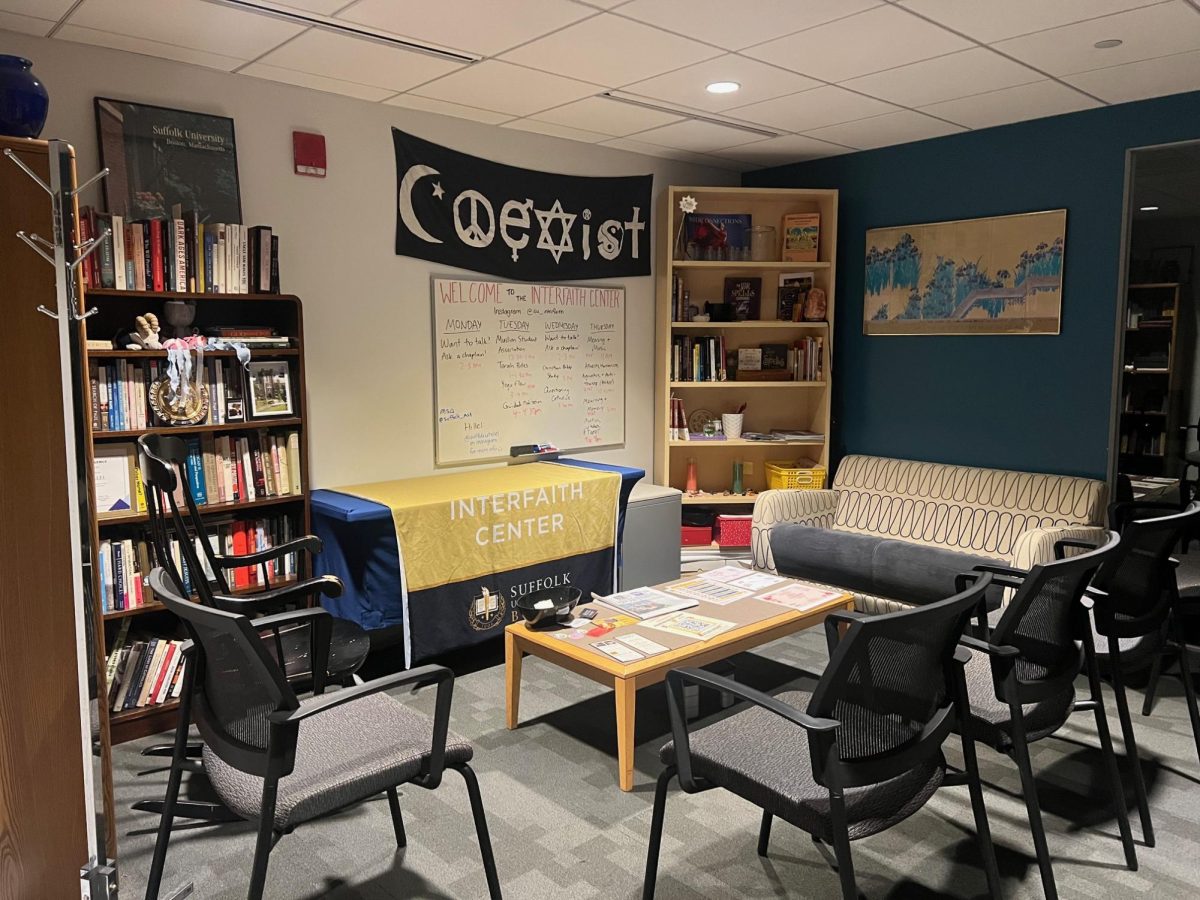Article by: Tom Russo
The Suffolk Journal and Suffolk Voice, in coordination with the Communications and Journalism Department, hosted a panel of experts at the C. Walsh Theater last Thursday to discuss the future of journalism in the digital age. Eight guests comprised two panels that bookended the keynote speaker of the event, Charlie Sennott, co-founder of Global Post. The panel was asked a variety of questions concerning the future of journalism while Sennott spoke about his career in traditional journalism and how it led him to start Global Post.
The discussion highlighted the changing nature of the journalistic profession and how to succeed in such a climate. “People came up after the discussion and asked about writing for the Suffolk Journal and Suffolk Voice,” said Alex Pearlman, Editor in Chief of the Suffolk Journal. “I think this discussion really showed Suffolk students that if you’re journalism major you should, at the very least, be writing for a publication at our school.”
Despite years of competition between the Suffolk Journal and Voice, the two groups came together for the first time to put on this event.
“Putting it all together was a lot of work but it came together nicely,” said Manny Veiga, Editor in Chief of the Suffolk Voice, “Alex and I worked well together and with the help of Bruce Butterfield and Nina Huntemann, we made it happen.”
The first panel consisted of Jessica Heslam, a reporter for the Boston Herald, Joshua Benton, director of the Nieman Journalism Lab at Harvard, Alex Pearlman, and David Beard, the editor of Boston.com.
The opening question for the panel dealt with where the panelists felt journalism was going technologically.
Personalization is key nowadays, “we want to be where you are most,” said Beard. Look for personalized news updates on your Facebook news feed or on your Twitter.
“People are very personalized online,” said Pearlman. “They want to pick what news they see and where they see it.”
This of course, challenges the typical print form and even makes one re-think communication vocabulary. In the past, media agencies were gatekeepers of information, using the limited print space for what the editors deemed most important. Now, we have a wealth of information and unlimited space, thanks to the Internet.
Still, one thing that will never change is the value of solid editors and solid reporters, says Heslam, a commodity that is central to the ability to filter and gather the important information.
After the introductory look to the future the discussion moved to those actually looking for careers in the modern market place. The Internet has many opportunities for entrepreneurial enterprises in journalism that didn’t exist before, said Beard. Thanks to the dynamic of the Internet, said Beard, “you will find an opportunity.” Benton weighed in saying, “You don’t need anyone’s permission to do work anymore. Don’t wait to work; the model of doing 40 years at a paper and then retiring is nearly obsolete.” The Internet allows journalists to do the work that they find interesting, to “become your own journalist” as Heslam said. Charlie Sennott spoke after the first panel had finished and was the keynote speaker of the afternoon. He told his story from the beginning of his career to where he was in the present. He said he started off as a “cop reporter” in New York, covering the first attempt at a terrorist attack on the World Trade Center towers in 1993. In 1996, Sennott began work as the Middle East Bureau Chief for the Boston Globe and lived in Israel where he began to raise his family. Eventually, the area got too dangerous and Sennott and his family were forced to relocate. After the September 11 attacks, Sennott had a new job covering world news as a correspondent in numerous different countries. By 2008, the world of journalism was still fast changing and the Globe was forced to phase out its foreign bureaus. Sennott thought he had found his dream job until it was cancelled, causing him to resign from the Globe on St. Patrick’s day of 2008. He came up with Global Post, an international news service with 70 correspondents in 50 countries. Since the sites inception, they have published “nearly 3,000 stories, videos and photo galleries, including numerous in-depth series on a very broad array of major international issues.” Global Post is the model for the face of journalism in the digital age.
In the same way that the reader has refined his taste for news, John Wilpers of BostonNOW.com, feels that journalists who want to work online should follow suit. “Bloggers are good niche workers, find something you are good at and are passionate about and become an expert.” Entrepreneurial opportunities can range from being paid to embed your blog on someone’s site or being offered a job. Publications find blogs they’d like to use by “digging and screening, looking for compelling stories, precise and consistent writing and coverage, and the use of credible stories,” said Wilpers, who went on to say that there are downsides to working in the digital age. “You have to learn things at such a fast pace, getting a job is difficult, and you must have a command over blogging, Twitter, RSS feeds, and services like Digg.” Adam Gaffin, Senior Editor of UniversalHub.com, highlighted other downsides to working online. “You are working alone; there is no news room so it can be lonely. You can’t get sick and you’ll be bringing your laptop on vacation. I also have a problem being a business man, and having to do things like selling ads.” David Warsh, of Economic Principles, highlighted another issue saying, that while there are many little niches covering slices of industry, anyone can join and there is a danger to the ease of entry to this business.”
While there are drawbacks, there are also strategies for coping with them. “Take everything you read online with a grain of salt, objectivity is not the be all and end all of journalism anymore,” said Worsh. Warsh suggests cross linking and checking most-read lists to determine if the service or blog you are using is valuable. Wilpers said that the core principles of reporting 101 and journalism 101 are still central to developing the validity and worth of a source.
Sennott said that one of the main bets that he and his partners have hedged for Global Post is that people will support good journalism. The Journal and Voice sponsored discussion educated students on what it looks like in the modern age. It may be a bit faster and not smudge your fingers, but it’s still about the same thing, said Sennott, “being there and telling a great story.”



















